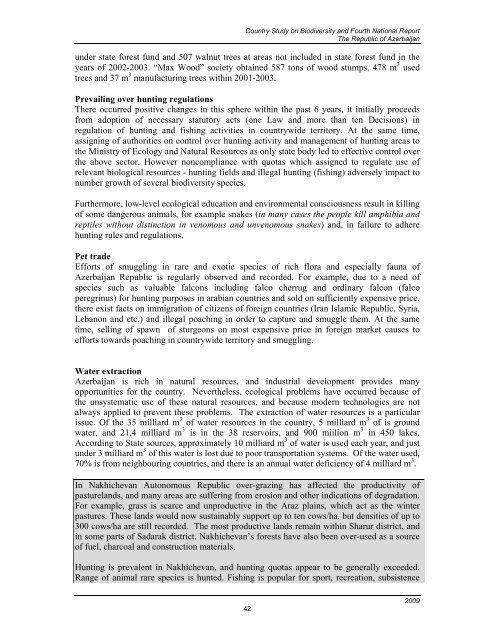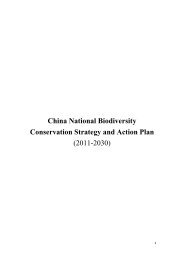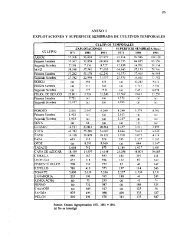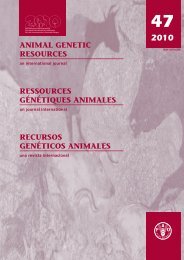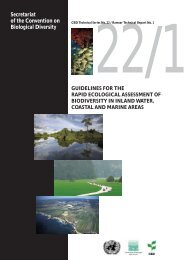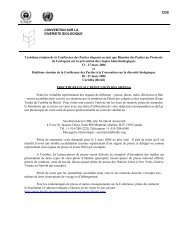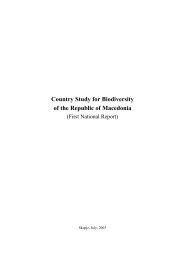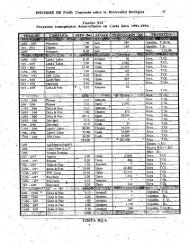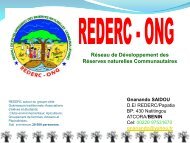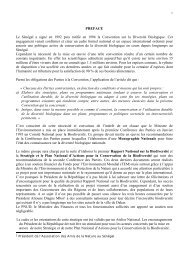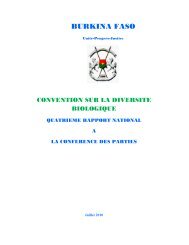CBD Fourth National Report - Azerbaijan (English version)
CBD Fourth National Report - Azerbaijan (English version)
CBD Fourth National Report - Azerbaijan (English version)
You also want an ePaper? Increase the reach of your titles
YUMPU automatically turns print PDFs into web optimized ePapers that Google loves.
Country Study on Biodiversity and <strong>Fourth</strong> <strong>National</strong> <strong>Report</strong><br />
The Republic of <strong>Azerbaijan</strong><br />
under state forest fund and 507 walnut trees at areas not included in state forest fund in the<br />
years of 2002-2003. “Max Wood” society obtained 587 tons of wood stumps, 478 m 3 used<br />
trees and 37 m 3 manufacturing trees within 2001-2003.<br />
Prevailing over hunting regulations<br />
There occurred positive changes in this sphere within the past 6 years, it initially proceeds<br />
from adoption of necessary statutory acts (one Law and more than ten Decisions) in<br />
regulation of hunting and fishing activities in countrywide territory. At the same time,<br />
assigning of authorities on control over hunting activity and management of hunting areas to<br />
the Ministry of Ecology and Natural Resources as only state body led to effective control over<br />
the above sector. However noncompliance with quotas which assigned to regulate use of<br />
relevant biological resources - hunting fields and illegal hunting (fishing) adversely impact to<br />
number growth of several biodiversity species.<br />
Furthermore, low-level ecological education and environmental consciousness result in killing<br />
of some dangerous animals, for example snakes (in many cases the people kill amphibia and<br />
reptiles without distinction in venomous and unvenomous snakes) and, in failure to adhere<br />
hunting rules and regulations.<br />
Pet trade<br />
Efforts of smuggling in rare and exotic species of rich flora and especially fauna of<br />
<strong>Azerbaijan</strong> Republic is regularly observed and recorded. For example, due to a need of<br />
species such as valuable falcons including falco cherrug and ordinary falcon (falco<br />
peregrinus) for hunting purposes in arabian countries and sold on sufficiently expensive price,<br />
there exist facts on immigration of citizens of foreign countries (Iran Islamic Republic, Syria,<br />
Lebanon and etc.) and illegal poaching in order to capture and smuggle them. At the same<br />
time, selling of spawn of sturgeons on most expensive price in foreign market causes to<br />
efforts towards poaching in countrywide territory and smuggling.<br />
Water extraction<br />
<strong>Azerbaijan</strong> is rich in natural resources, and industrial development provides many<br />
opportunities for the country. Nevertheless, ecological problems have occurred because of<br />
the unsystematic use of these natural resources, and because modern technologies are not<br />
always applied to prevent these problems. The extraction of water resources is a particular<br />
issue. Of the 35 milliard m 3 of water resources in the country, 5 milliard m 3 of is ground<br />
water, and 21,4 milliard m 3 is in the 38 reservoirs, and 900 miilion m 3 in 450 lakes.<br />
According to State sources, approximately 10 milliard m 3 of water is used each year, and just<br />
under 3 milliard m 3 of this water is lost due to poor transportation systems. Of the water used,<br />
70% is from neighbouring countries, and there is an annual water deficiency of 4 milliard m 3 .<br />
In Nakhichevan Autonomous Republic over-grazing has affected the productivity of<br />
pasturelands, and many areas are suffering from erosion and other indications of degradation.<br />
For example, grass is scarce and unproductive in the Araz plains, which act as the winter<br />
pastures. These lands would now sustainably support up to ten cows/ha, but densities of up to<br />
300 cows/ha are still recorded. The most productive lands remain within Sharur district, and<br />
in some parts of Sadarak district. Nakhichevan’s forests have also been over-used as a source<br />
of fuel, charcoal and construction materials.<br />
Hunting is prevalent in Nakhichevan, and hunting quotas appear to be generally exceeded.<br />
Range of animal rare species is hunted. Fishing is popular for sport, recreation, subsistence<br />
42<br />
2009


